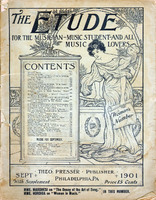Some years ago it was unusual for a woman to study the organ. The difficult fingering, the heavy pedaling, the complicated stops were wisely deemed obstacles which ought to deter a girl from attempting it. Her physique was not equal to the strain. America pronounced judgment against her physical fitness; Germany questioned her musical ability. The first woman to study the organ in Berlin under the celebrated Prof. August Haupt was refused the use of the church-organ assigned her: “A woman had never played it!”1 Notwithstanding all precedent and prejudice, however, the execution learned at home won such confidence that permission was finally granted her to practice without any compensation to church or organist. This was an American victory.
To-day woman’s musical ability is recognized on both continents. Electrical action and automatic pedals have removed the last prudential scruples. In this new century the career of organist is as unquestioningly open to women as to men.
The musical woman is a good organ-student. Her success during student-days encourages her professors to believe she can equal and may surpass the execution of her brother-students in after-years; but at present she rarely fulfills this promise. Still, critical musical instructors affirm that woman has the soul qualities which fit her to gain even finer results than man. She has a greater enthusiasm, finer sensibility, and as keen musical intuitions; her hands are as flexible, her memory as retentive, her patience and perseverance as unwearied and unflagging; yet a woman rarely becomes a widely-known organist. The reason is obvious. The parents of the girl-student seldom take her music seriously. They regard it as an accomplishment or as a desirable means of earning pin-money until she shall be established in a home of her own. They feel that for her a few lessons on the organ will suffice; whereas if the boy chooses music as a profession, his guardians recognize the need of thorough training for him in a musical career. A boy therefore has the advantage of better preparation for his work.
Marriage only spurs the man to greater and richer achievement. Marriage, for the woman, usually means abandonment of public service and desertion of the beloved instrument. Thus, marriage commonly overshadows a woman’s career in the eyes of her parents and friends from the beginning, so that she rarely has the same rich opportunities for developing her musical gifts that are accorded her brother-students; yet the woman has the soul, the ability, the perceptions to compete successfully with men in a musical career.
It was formerly believed that woman lacked the mental grasp, the virile brain-power to become a musical composer. The works of Mrs. Rogers, of Madame Hopekirk, of Liza Lehman, of Mrs. H. H. A. Beach prove that she has not only appreciation of musical composition, that she possesses not only the insight and power to interpret and reproduce what others have conceived, but that she likewise possesses the talent, when her powers have been trained, to compete with the musicians of this new century in the realm of musical composition.—Emilie Grant-Wilkinson.



